WEDNESDAY, January 28th, 2009
Message from Kerstin Schulte
The first lecture on the third day of the International Business Week was given by Jürgen Rigterink from the FMO, a Development Finance Company. The topic was „The effects of the Financial Crisis on Emerging Markets: from a Development Bank’s Perspective”. After Mr Rigtering introduced the FMO with a video and explained it’s function, he went into details about the past and current financial situation in emerging markets and some further consequences. Afterwards, he talked about the consequences for countries and gave an insight in what the crisis means for Africa, which is surprisingly not as immune as many people think it is. What the FMO does and where the bank invests became more clear after Mr Rigtering gave two examples: One of a wood and paper producing company in Argentina and another of an universal bank in Georgia. Finally, the lecture was rounded off with a Q&A session.
The second lecture was given by Michaele Carriere who all of you probably know and it was about the “Relativity – Domains of Ethics and Culture in International Business”.
Probably most of you have filled out a questionnaire about ethical and cultural competences during this year’s introduction phase. Michaele Carriere was responsible for this research as she investigated how effective the IBS is in teaching these competencies, by observing 1st, 2nd and 3rd year students. Mrs Carrier is still busy with this research and she presented some intermediary results. The fact that these findings raised many questions and ended up in discussions showed that this research was worth it and there is still a need for further investigation.
This afternoon started with a lecture on the global financial credit crisis given by Wouter van der Stok. After Mr Stok had already given an introduction about the current situation and the causes of the crises on Tuesday, this was already the second part of the threepart lecture. Therefore, he continued today with an analysis of the situation and talked about possible solutions for the crisis and a realistic time frame. Finally, he gave a brief comparison between the present situation and the 1929/39 depression. On Thursday the third part of this lecture will take place and I am already looking forward to what he will deal with.
This day rounded off with a lecture and a guided tour through the Gasunie in Groningen, a European gas infrastructure company. After some initial coffee in the reception hall we followed an interesting lecture given by Hans Coenen; the CFO of the Gasunie Germany. He talked about the transforming energy chain and gave an overview of past achievements, present changes and a future outlook of the Gasunie. The network of the company ranks among the largest high pressure gas pipeline grids in Europe, consisting of over 15,000 kilometres of pipeline. The fact that the European gas production decreases while the demand in Europe increases shows how dependent we are from supply sources. That is also the fact why gas can always be associated with power and politics. To make this clearer, Mr Coenen addressed the issue of the recent gas crises and the dispute between Russia and the Ukraine. Furthermore, the importance of an adequate infrastructure was pointed out, where Gasunie becomes involved. After the lecture which was rounded off with a Q&A session, we were divided into three groups of 25 people each and we were guided through the building. I was impressed by the consistent organic architecture – the whole building was full of plants and there was no rectangularity which underlined the natural aspects of the architectural style. The Gasunie-headquarter was built in 1993 and was designed by the architects Alberts & van Huut. It was chosen to be the most beautiful building of the Netherlands by the Dutch newspaper readers which I can definitely understand. I can hardly imagine that people actually work there and the trip was definitely worth a visit.
-------------------------------------------------------------------------------------------------
Message from Kathy Ruiz
Bram ten Kate opened the day by introducing the first guest- Jurgen Rigterink who is the Chief Investment Officer (CIO) of FMO, a Dutch financial company engaged in investing in emerging markets. The topic of the presentation was “The effect of the financial crisis on emerging markets.”
The presentation started with a movie which was about the FMO’s core business-investing in emerging markets. In the movie, the CEO of the company pointed out the basic attributes of the emerging markets, the countries where the company operates in, and how FMO differs from the commercial banks.
After the movie, Jurgen Rigterink took over and continued elaborating on the structure of FMO, types of emerging markets, and the short and long-term effects of the financial crisis on those markets. It was clear that the presenter was truly knowledgeable and he could draw attention. In addition, his message was sent across and triggered an interesting discussion and questions even amongst teachers.
It is important to point out that, despite the seriousness of the subject, Mr. Rigterink had sense of humor which appealed to the audience. Talking about the financial crisis and the ‘black swan’ events, he started the core of his presentation with the following question: ‘What is the difference between the Zimbabwean economy and Wall Street’ and the answer was: ‘There is some hope for Zimbabwe’.
Giving appropriate examples and telling more about his experience, of which he mentioned his work life in Kazakhstan and a recent meeting with the CEO’s of African banks in Washington, increased the spotlight on him even further.
The interactive nature of the presentation grew even more when Mr. Rigterink introduced two cases from FMO’s practice. They were about a paper-producing company in Argentina and a universal bank of Georgia. The follow-up discussion raised various questions to which the CIO gave complete and clever answers.
In a nutshell, the presentation was very professional, well conducted, informative, and provided real-life examples.
Thursday, January 29, 2009
Subscribe to:
Post Comments (Atom)

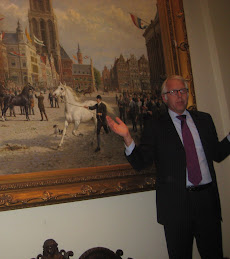
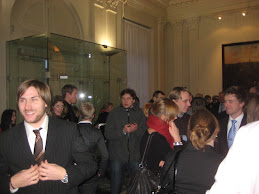
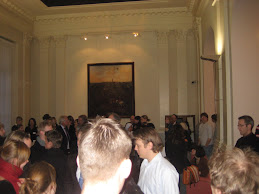






















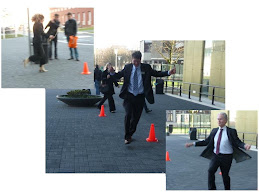




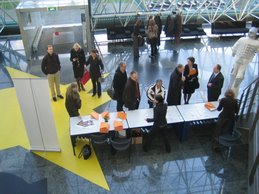





No comments:
Post a Comment